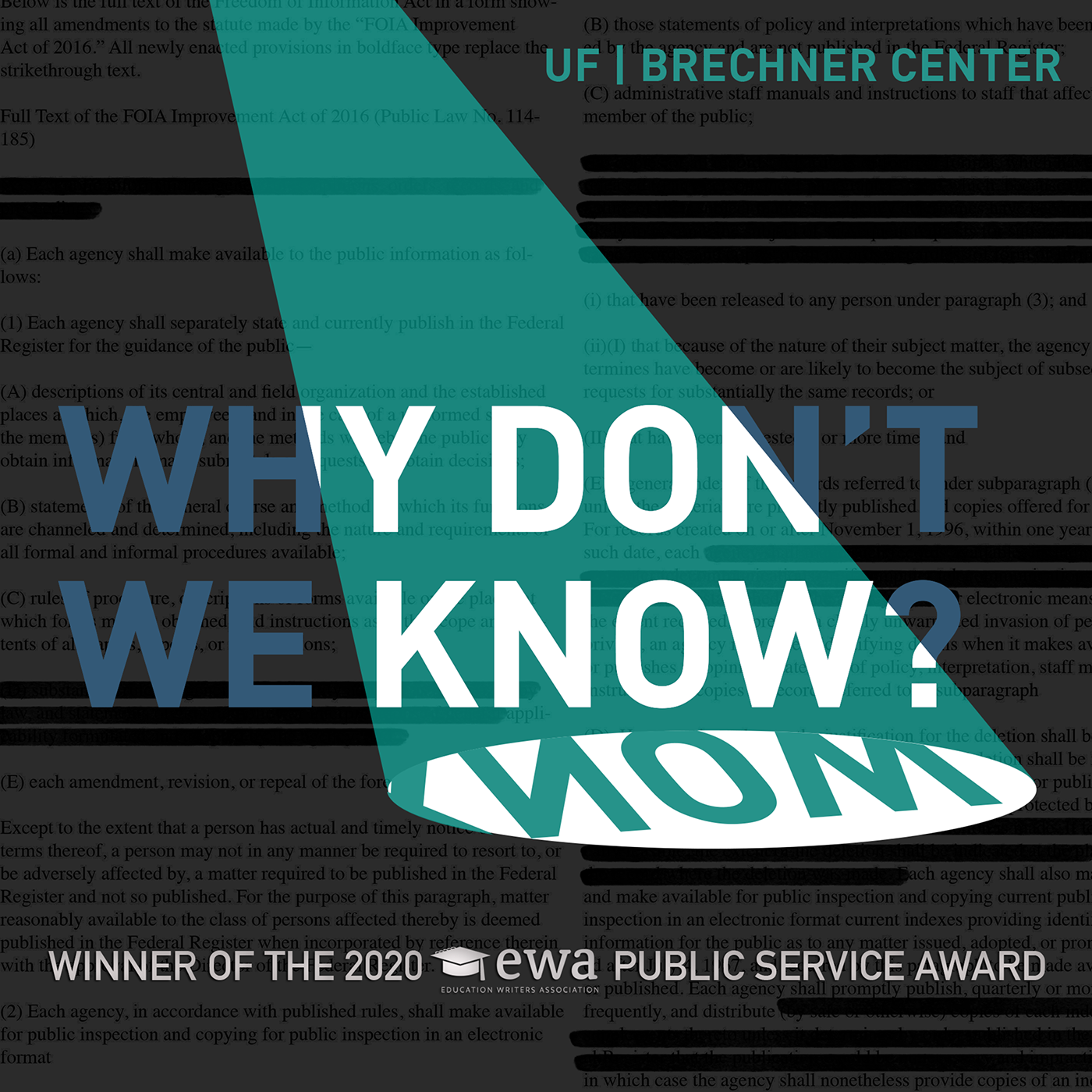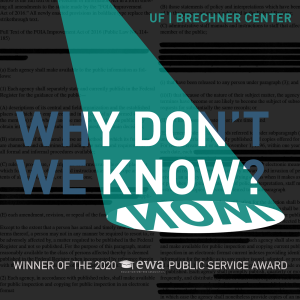
18.4K
Downloads
30
Episodes
From school safety, to secret police, to environmental toxins, Why Don’t We Know the information we need to keep us safe? To make our systems more just? To protect ourselves from the things that are hurting us? How is privacy being weaponized to protect those doing harm, instead of those who are being harmed? This ... is Why Don’t We Know.
Episodes

Friday Jun 14, 2024
We actually won a FERPA appeal
Friday Jun 14, 2024
Friday Jun 14, 2024
We close out Why Don't We Know with a huge victory - a win against the abuse of FERPA, the federal privacy law that often leads to harmful secrets in schools. In this episode, we beat FERPA to get a video of an encounter between a school police officer and a student in Jeannette, Pennsylvania.

Wednesday Jun 12, 2024
The unintended consequence of police in schools
Wednesday Jun 12, 2024
Wednesday Jun 12, 2024
The complicated and misunderstood history of having police officers in schools, and one group of students first-hand stories of what it means to have them in their hallways.

Tuesday Jun 11, 2024
Why do children end up in juvy?
Tuesday Jun 11, 2024
Tuesday Jun 11, 2024
In our final drop of episodes for Why Don’t We Know, we explore the secrecy of the juvenile justice system, starting with how kids are often punished with fees and fines.
More than 30 states allow kids to be fined while in the juvenile system, and it’s very difficult to figure out how many children are affected because there is such poor data.

Friday Feb 17, 2023
Whistleblower
Friday Feb 17, 2023
Friday Feb 17, 2023
What happens when a police officer breaks the silent code and speaks out about misconduct? This is the story of Cariol Horne, a former Buffalo cop who tried to do the right thing and is paying the price.

Friday Jan 27, 2023
Why Is Data Collection So Darn Difficult?
Friday Jan 27, 2023
Friday Jan 27, 2023
In May of 2015, shortly after the shooting death of 18-year-old Michael Brown by a Ferguson, Missouri police officer, former President Barack Obama traveled to Camden, New Jersey to announce a new program that was supposed to help repair the broken relationship between police and communities of color. This Police Data Initiative was to take poorly kept data and make it better, more uniform, and more accessible to the general public. The notion was that better data on policing would ultimately improve transparency and accountability between police and citizens. But today, if you visit the website for the police data initiative, what you’ll find is, “sadly, it's on life support,” it’s director says. “And I would say we're probably planning the funeral service for it.”
It’s not alone.
Across the country, government initiatives aiming to collect better data for the criminal justice system have failed or are struggling.
Host: Sara Ganim. Reporters: Trey Ecker, Hannah Himmelgreen, Dana Cassidy. Guests: Jim Burch, Scott Carver, Gipsy Escobar, Eddie Brown.
Editors: Amy Fu, James Sullivan. Original score: Pete Readman. Research: Brittany Suzsan. Produced by The Brechner Center for Freedom of Information at The University of Florida.

Friday Jan 20, 2023
Who Are Body Cameras Really For?
Friday Jan 20, 2023
Friday Jan 20, 2023
After the nationwide protests following George Floyd’s death, we did a little experiment to see if we could get body worn camera footage from officers at the scene of protests where we knew there were injuries.
Host: Sara Ganim. Reporters: Kristin Moorehead, Thomas Holton. Guests: Mary D. Fan, Dan Adams, Sarah Jensen, Patrick Michaud, Lauren Bonds, Gideon Oliver.
Editors: Amy Fu, James Sullivan. Original score: Pete Readman. Research: Brittany Suzsan. Produced by The Brechner Center for Freedom of Information at The University of Florida.

Friday Jan 13, 2023
”Police Say”
Friday Jan 13, 2023
Friday Jan 13, 2023
In the moments after 21-year-old Kevin Peterson Jr. was killed, Clark County Sheriff Chuck Atkins took to a podium to defend his deputies.
Although he started with a warning, “I am waiting along with you to learn about much of the details,” Atkins speculated about something significant that would soon become very clearly incorrect: “The man reportedly fired his weapon at the deputies.”
Police reform advocates describe this as an assassination followed by a character assassination and an analysis of 14 cases - some high profile and some not - shows that distorted narratives that make the dead or injured look worse or make the police look better are often given to the public after the use of excessive or deadly force.
Host: Sara Ganim. Guests: Olivia Selto, Mark Lindquist, Deborah Jacobs, Jeff Campiche, John Urquhart, Carolyn Carson.
Editors: Amy Fu, James Sullivan, Thomas Holton. Original score: Pete Readman. Research: Brittany Suzsan. Nonfumo Manaba, Alexandra Harris, Kaylee Whidden, Vivian Ionesco, Ariana Aspuru, Jessica Turkovich, Trey Ecker, and Brett Posner-Ferdman.
Produced by The Brechner Center for Freedom of Information at The University of Florida.

Friday Jan 13, 2023
Welcome to Season 2 - The Criminal Justice System
Friday Jan 13, 2023
Friday Jan 13, 2023
Season 2 of Why Don’t We Know starts here, with a preview of our season about secrecy in the criminal justice system. Host Sara Ganim starts by explaining why we are here and how we found our reporting.
Host: Sara Ganim. Editors: Amy Fu, James Sullivan. Original score: Pete Readman. Research: Audrey Mostek, Brittany Suszan Produced by The Brechner Center for Freedom of Information at The University of Florida.

Wednesday Oct 26, 2022
Special Episode: Jason Leopold - Ultimate Transparency
Wednesday Oct 26, 2022
Wednesday Oct 26, 2022
In this special episode, we bring you a live taping of the first-ever Brechner Speaker Series, co-hosted by the Brechner Center for Freedom of Information and the Bob Graham Center for Public Service, featuring award-winning investigative reporter Jason Leopold, who has broken some of the top stories of our time using the Freedom of Information Act (FOIA.) Nicknamed "the FOIA terrorist" by government officials who are forced to answer his requests, Jason talks about ultimate transparency in government and in his own personal life.
He is the reporter who forced Hillary Clinton's emails to become public, exposed a religion test used by the U.S. Military, and illegal practices by big banks, which became an investigation known as the FinCEN Files.
Host, Sara Ganim. Guests, Matt Jacobs, Hub Brown, Jason Leopold.

Thursday Jun 02, 2022
Special Episode: ’Gag order’ against sexual assault
Thursday Jun 02, 2022
Thursday Jun 02, 2022
In this special episode, taped live at SXSW EDU in Austin, Texas in March, we discuss how schools are bullying young sexual assault accusers into waiving their rights during school investigations into what happened to them. Title IX is supposed to protect students who allege sexual assault, but some schools are requiring their silence, and threatening discipline if they don't comply.
It runs afoul of the law, many experts say, and led attorney Laura Dunn and the non-profit Equal Rights Advocates to pen a letter to the U.S. Department of Education, trying to get the Biden Administration to stop this practice from continuing. Host: Sara Ganim. Guests: Laura Dunn, Kel O'Hara.
